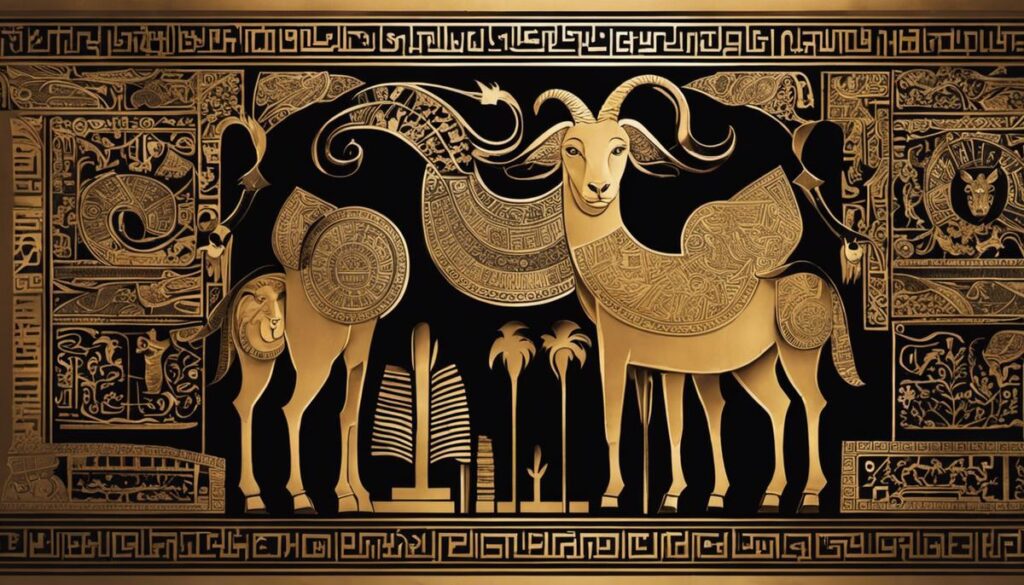In the robust tapestry of dreams, one symbol that often soars above the rest is the eagle, an emblem of such power and grace that it has left a profound imprint, not just in the realm of the mundane, but also in religious and spiritual contexts. Its significant presence in the Holy Bible births a rich vein of symbolic interpretations treasured across the passages of time. This expedition we embark on attempts to demystify the biblical meaning of eagles within dreams, reframing them in the broader context of their symbolic representation as chronicled in scriptures. Further, we delve deep into the world of biblical dream interpretations, shedding light on the intricate web woven by various narratives that guide spiritual understanding. Simultaneously, considering the scientific contributions by psychology and neurology towards comprehending our dreams, provides a fuller, multidimensional perspective. Ultimately, drawing upon both religious symbolism and scientific theories, we will explore the profound meanings that an eagle’s presence in dreams could potentially harbor.
Symbolism of Eagles in the Bible
The Eagle in Biblical Symbolism: An Examination of Context and Metaphorical Significance
In the expansive world of religious literature, the Bible holds an unparalleled place with its rich symbolism elevating its narratives to an unprecedented level of significance. Amongst this profound symbolic repertoire, the eagle, a bird distinguished for its exceptional vision and powerful flight, occupies a unique place in biblical narratives. This remarkable avian creature, recognized for its ability to soar high above earthly confines, symbolizes divine intervention, prophetic insight, and spiritual fortitude throughout biblical passages.
In the book of Exodus (19:4), one comes across the first biblical mention of eagle symbolism. The verse notes ‘…I carried you on eagles’ wings and brought you to myself,’ manifesting God’s saving and protective nature. This portrayal bestows upon the eagle an image of revered strength and security, signifying the divine providence of the Almighty.
The book of Isaiah introduces us to another facet of eagle symbolism. Isaiah 40:31 states, “But those who hope in the LORD will renew their strength. They will soar on wings like eagles; they will run and not grow weary, they will walk and not be faint.” Not only does this verse encapsulate the divine promise of renewal but also connotes the resilience and endurance of the faithful under trials, reinforcing the eagle as a symbol of spiritual vigor and steadfastness.
The prophetic prowess of eagles resonates strongly in the book of Ezekiel (1:10) and Revelation (4:7), where eagles symbolize prophetic vision and keen insight. The eagle’s transcendent flight and precise vision figure significantly in these books, symbolizing a realm beyond ordinary perception, a spiritual insight into divine mysteries.
The eagle’s correlation with divine judgment is depicted in the book of Hosea (8:1) and Revelation (8:13). Here, the eagle’s piercing eye and swift action are equated with God’s righteous judgment, serving as an embodiment of divine intervention against idolatry and wickedness.
It is essential to foster an understanding of the sociocultural context of biblical times to appreciate fully the import of these symbolic representations. For the peoples of the ancient Near East, the eagle was a powerful and sovereign creature, attributes that undoubtedly influenced its representation in the biblical texts. Its lofty flight, detached from terrestrial confines, earmarked the eagle as an icon of the divine, making it a fitting symbol for expressing the transcendent aspects of the deity and the perfect instrument for communicating divine messages to human beings.
In conclusion, the eagle, with its remarkable vision, transcendent flight, and sovereign rule, encapsulates a host of divine attributes within biblical symbolism – from divine protection and spiritual strength to prophetic insight and divine judgment. Ultimately, the eagle serves as a conduit between the earthly and the divine, strengthening spiritual narratives and offering profound insights into the multi-layered symbolism embedded within biblical literature.

Interpreting Biblical Dreams
Unveiling the Mysteries: Biblical Dream Interpretation
An astute exploration of Biblical narratives reveals that dreams have been a critical tool for divine revelation and prophecy. These celestial communications have altered personal lives, influenced political institutions, and shaped spiritual destinies. Consequently, Biblical dream interpretation necessitates a profound understanding of divine symbology, historical contexts, theological nuances, and, quite importantly, the metaphoric language often used in these enigmatic visions.
Largely, in Biblical model of dream interpretation, views are divergent between those who perceive dreams as direct divine messages requiring spiritual deciphering and those who understand them as reflections of the dreamer’s mental state requiring psychological interpretation. However, both approaches are significant in the hermeneutic scheme of Biblical dream interpretation.
When interpreting dreams biblically, the work of figures like Joseph and Daniel serve as relevant examples. Their ability to interpret dreams was directly linked to their devotion to divine instruction. Notably, their interpretations were facilitated by meticulous analysis of symbolic figures and their contextual relevance, as observed in the dreams of Pharaoh in Genesis 41 and King Nebuchadnezzar in Daniel 4.
According to a biblical frame of reference, the symbology of dreams is often profoundly metaphorical. Just as the often-discussed eagle is symbolic of divine sovereignty and intervention, various other elements in dreams may allude to specific theological concepts or events. For instance, bodies of water are commonly associated with life and cleansing, while bread might symbolize sustenance or resurrection.
Moreover, it is necessary to grasp that interpretation is not a random endeavor but hinges on the context or narrative structure of the dream. Acknowledging that biblical dream interpretation bridges the gap between colossal divine communication and the finite human understanding is paramount in this process. This is well evident in the case of Daniel, who acknowledges that the understanding of dreams and symbols is not due to his own wisdom but to divine revelation (Daniel 2:27-30).
Simultaneously, a central aspect of Biblical dream interpretation encapsulates the acknowledgment of the effects of cultural and historical circumstances on symbolism. For instance, the image of a sword in a dream during peaceful times might signify very different metaphorical meanings than during a period of war.
Structurally, biblical dreams can be classified into symbolic dreams, which entail significant symbols needing interpretation, and direct message dreams, in which the divine message is explicitly conveyed. This distinction strongly influences how the dream is to be interpreted.
Furthermore, observing the correlation between dreams and subsequent events in biblical narratives aids in the understanding of consistent symbolisms in biblical dream interpretation. The birth, life, and resurrection of Jesus Christ, perhaps the most paramount narrative, was foreseen and communicated through dreams, demonstrating the critical role they play in the Bible.
Ultimately, interpreting dreams according to biblical principles requires an amalgamation of linguistic, contextual, theological, and historical understanding. It is a pursuit that goes beyond the dream itself, venturing into the realms of heavenly wisdom and divine truth. As is such, the interpretation process provides an enriching experience of contemplating human-divine relations and gaining spiritual wisdom deeper than the immediate dream narrative presents.

The Psychology of Dreams
Title:
The Psychological Insights of Dreams in Biblical Narratives
Venturing deeper into the realm of dream symbolism in Biblical narratives reveals a fascinating psychological landscape, replete with diverse interpretations and potential for profound insights. Dreams in the Bible are not just cornerstones of fascinating narratives, but also reveal deeply entrenched psychological significance, which has been the subject of numerous studies.
In the realm of psychology, dreams have long been regarded as portals into the subconscious mind. This conceptual framework is certainly mirrored in Biblical dream narratives, replete with complex symbolism and profound emotions. Crucially, these dreams within biblical narratives are often perceived as divine messages, providing motivation, guidance, and insight to key characters.
A prominent example can be found in the dreams of Joseph in the Book of Genesis. Joseph’s dreams were psychologically significant in the sense they harbored prophetic clues to his future, suggesting an intriguing interplay between the subconscious mind and perceived future outcomes. This connection has catalyzed a bounty of psychological research probing the prophetic nature of dreams and their potential correlation to programming future behaviors and insight into events yet to unfold.
In addition, the dreams in the Book of Daniel were laden with encoded messages requiring interpretation, intricately blurring the boundary between the conscious and subconscious. The complexity and nuance of these encoded dreams have compelled psychologists to delve deeper into exploring the utilization of symbols by the subconscious mind.
Interestingly, the context and narrative structure in these Biblical dream interpretations provide a meaningful framework for understanding dream psychology. The methodology of dream analysis in the Bible often amalgamates linguistic, historical, and theological perspectives, forming a comprehensive approach to dream interpretation. This comprehensive approach has caught the attention of several psychological theorists, who consider it a precursor to the multifaceted techniques used in modern dream analysis.
Moreover, revelation of divine wisdom and pursuit of truth through dream interpretation in biblical narratives captivate the interest of psychologists. The ability of these dreams to stimulate psychological growth and promote personal kernels of wisdom is an intriguing nexus where faith and psychology intertwine. This is particularly pertinent to direct message dreams, which are typically associated with transmission of wisdom or warnings, casting light on the powerful psychological impact of perceived divine messages.
Furthermore, the psychological import of dreams in biblical narratives is accentuated by the correlation with subsequent events in the narratives themselves. The prophetic nature of these dreams and their direct consequences in the biblical reality suggest a compelling dynamic — one that stimulates contemporary psychological discourse on dreams’ predictive and preparatory power.
Perhaps one of the most engaging aspects of biblical dream interpretation resides in the cultural context it provides. Notably, dreams were viewed dependently on situational factors such as social status, historical period, or cultural norms reflective of ancient Near Eastern societies. Psychologists have taken a keen interest in these cultural influences on dream symbolism, examining wider cultural patterns and beliefs, translating them into a broader comprehension of universal psychological processes.
In conclusion, dreams in biblical narratives pose as meaningful instruments of divine intervention, offering not just prophetic visions but also revealing a plethora of psychological insights. The richness and diversity of these narratives provide a foundation for a deeper exploration of the significant role dreams have played within mental processes throughout history.

Photo by all_who_wander on Unsplash
Eagles in Dreams – Their Biblical Interpretations
Subjecting the biblical occurrence of eagles in dreams to a closer lens of exegetical interpretation presents profound correlations with themes of divine rapture, prophetic vision, and spiritual liberation. These themes dovetail seamlessly into the overarching motif of divine communication, echoing God’s presence and guidance via visceral, symbolic metaphoric language — a language that speaks to the human psyche through dreams.
Across biblical concordance, dreaming of eagles points towards spiritual insights and heightened consciousness. As per the metaphorical predilections of biblical language, an eagle-encounter in dreams is associated with an imminent revelation or spiritual broadening– a form of transformative spiritual renewal. This functions akin to the eagle’s natural aptitude to soar heights, thus symbolizing elevations in spiritual understanding, strength and freedom.
Additionally, an exegetical reading of biblical instances brings to light the symbolic correlation of the eagle to prophetic visions. Dreaming of eagles embodies the anticipation of divine messages or revelations. Evoking the prophetic narratives of Ezekiel and John’s Revelation, this connection underscores the transcendental aptitude to perceive, comprehend, and articulate divine revelations.
The interpretation of eagles in dreams is also intertwined with the biblical motif of deliverance and divine intervention. The biblical narrative of Exodus correlates the symbol of the eagle to divine protection and deliverance, a symbolism that is echoed when dreams of this majestically sovereign creature emerge.
Additionally, dreams featuring eagles carry an implicit correlation to the themes of divine judgement and retribution illustrated in Hosea and Revelation. The eagle is utilised as a divine agent, manifesting God’s sentencing of retribution against disobedience.
Drawing into the cultural context of ancient Near Eastern associations, symbolism assumes a profound significance in dream interpretation. Eagles, formidable and sovereign, serve as symbolic representations of power, majesty, and authority. Their cultural value translates into the biblical representation of divine qualities signified by the eagle.
Given the immense significance ascribed to eagles within the biblical-symbolic tapestry, their appearance in dreams consolidates them as vessels of divine communication, unlocking myriad meanings embedded in the unconscious mind.
Hence, the interpretation of seeing eagles in dreams pivots around major biblical themes. Utilizing an interdisciplinary approach amalgamating linguistic, historical, theological, and cultural perspectives will enable a robust comprehension of these instances. It is crucial to decipher these symbols not only for their inherent knowledge but also to holistically embrace the wisdom and truth they direct us towards.
In conclusion, the roles eagles play in biblical narratives – divine intervention, protection, judgement, and prophecy, along with their testament to spiritual renewal and liberation, reverberate effectively when they permeate through dreams. The interplay of dream symbolism in biblical narratives with the innate wisdom they foster, unveils the immense potential these dreams hold, not just in understanding the realm of the divine but also in the cultivation of personal wisdom and self-growth. Their appearance in dreams is less a statement of mere occurrence, but rather a divine dialogue that needs continuous exploration, interpretation, and eventual internalization.

The vast, symbolic universe of dreams is as profound as it is personal, demanding a delicate balance between understanding the communal heritage of symbols and the individual’s unique psyche. Our journey through the critical exploration of biblical symbolism, dream narratives, and psychological theories allows a harmonious synthesis of perspectives and a comprehensive understanding of how an eagle in a dream may be deciphered. This cross-pollination of faith and science broadens our horizon, extending beyond mere academic interest into the realm of introspective contemplation. As we soar with the eagles in our dreams, they cease to be mere symbols of biblical teachings or psychological constructs. Instead, they transfigure into powerful spiritual companions guiding us towards newfound insight, wisdom, and self-realization, bestowing upon us the gift of deepened understanding and burgeoning self-awareness in a world awash with both dream and reality.







